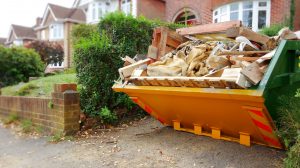What Things Can You Not Put in a Skip?
Understanding Skip Bin Regulations
When it comes to waste disposal, skip bins are a convenient option for handling various types of rubbish. However, it’s essential to be aware of the restrictions on what you can and cannot dispose of in a skip. Failing to comply with these regulations can lead to fines and environmental hazards.

What things can you not put in a skip?
Prohibited Items
While skip bins can accommodate a wide range of materials, there are several items that should never be placed in them. These include:
- Hazardous Waste: Items such as chemicals, asbestos, paint, batteries, and pesticides pose a significant risk to both human health and the environment. They require specialized disposal methods and should never be put in a skip.
- Electrical Appliances: Electronic devices like TVs, computers, and refrigerators contain hazardous components that can leach into the soil and water if not disposed of properly. Instead, consider recycling these items through designated e-waste programs.
- Flammable Materials: Skip bins are not suitable for disposing of flammable substances such as gas canisters, oil drums, and fireworks. Improper disposal of these items can lead to fires and explosions, posing a danger to the surrounding area.
- Medical Waste: Items such as syringes, needles, and medical equipment should never be placed in a skip bin due to the risk of spreading infections and diseases. Medical waste must be handled and disposed of according to strict guidelines.
- Large Bulky Items: While some skip bins can accommodate furniture and mattresses, excessively large or heavy items may exceed weight limits and damage the bin. Check with your skip bin provider for guidance on disposing of oversized objects.
Alternative Disposal Methods
For items that cannot be placed in it, there are alternative disposal methods available:
- Specialized Collection Services: Many local authorities offer collection services for hazardous waste, bulky items, and electronic waste. Contact your municipality to inquire about these services and schedule a pickup if needed.
- Recycling Centers: Recycling centers accept a wide range of materials, including paper, glass, plastic, and metal. By sorting your waste and taking recyclable items to a recycling facility, you can help reduce landfill waste and conserve natural resources.
- Charity Donations: Consider donating gently used furniture, clothing, and household items to charity organizations instead of disposing of them in a skip bin. This not only helps those in need but also reduces waste and promotes sustainability.
- Professional Disposal Services: For hazardous materials and specialized waste, hiring professional disposal services may be necessary. These companies have the expertise and equipment to safely handle and dispose of difficult-to-manage items.
Conclusion
While they offer a convenient solution for waste disposal, it’s crucial to adhere to the regulations regarding acceptable materials. By understanding what items cannot be placed in a skip and exploring alternative disposal methods, you can ensure the safe and responsible management of your waste. For Woodys skip bins in tweed heads see here.

